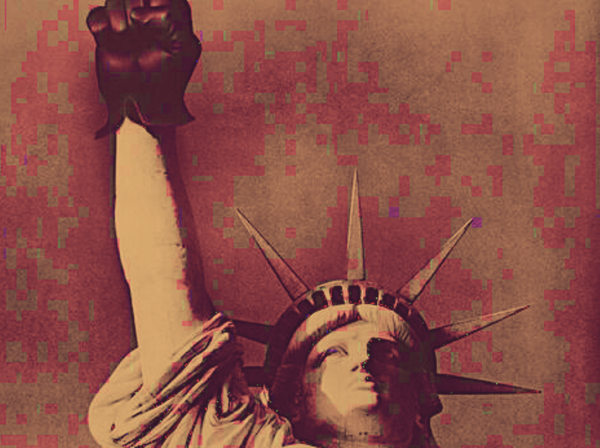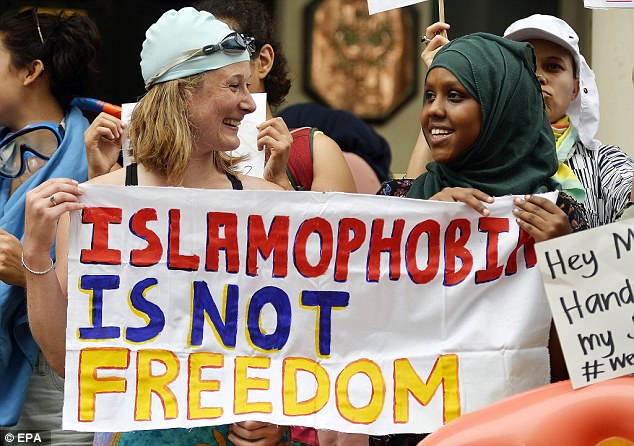In America's grim funhouse reality, the confusion is the message.
The Woke State: Today America, Tomorrow the World?

The West’s religious way of war comes home to roost.
There’s a disagreement about the stakes of today’s volatile political moment among some of the leading observers—disclosure: friends all—on the Right. Ross Douthat worries that too strong a strain of apocalypticism has set in, with Sohrab Ahmari and Rod Dreher leading the anti-totalitarian charge against the new post-liberal Left. They are dismayed chiefly by the confluence of what Ross calls “pressure from the heights of big media, big tech, and the education system,” which, in Rod’s language, has forged “powerful mechanisms for controlling thought and discourse.”
The spirit of reaction against this control is now so pronounced, Ross says, that the Right in America consists increasingly “of anyone, whether traditionalist or secularist or somewhere in between, who feels alarmed by growing ideological conformity within the media and educational and corporate establishments.” Why the change? Ross identifies three surprises. Americans were shocked when the digital revolution failed to decentralize technological power more than the tech elite managed to concentrate it. Young leftists were shocked by the failures of liberal elites. And the established class expert in pre-digital communications technologies was shocked by a two-pronged attack on its authority, one pincer formed by the very online Right, the other by Donald Trump. The result? A Right turned populist, a Left turned woke, and an establishment turned draconian. Combine these three ingredients, and the product is an anxious Right convinced that a new “cultural authoritarianism” newly inheres “in tech and media consolidation.”
How justified is this fear? According to Ross, not as much as meets the eye. Today’s political volatility, where control of America (or what succeeds it) hinges on whose hands seize the jump ball next, is more complex an environment, by Ross’s lights, than those to his right believe. Rather than a finishing blow locking in permanent control one way or the other, we more likely face an extended grind marked by repeated reversals of fortune. Rather than rallying freedom-loving normies to the anti-authoritarian cause, Trump’s unprecedented approach to the presidency more likely drives mushy-middle voters to chance it on the liberal establishment, whatever the risk of emboldening the woke.
After all, there’s something about the new machinery of rule on the Left that just can’t seem to reach into the ever-multiplying and deepening nooks of life in the digital age. Yes, “the mix of elite consolidation and radicalization that conservatives fear is entirely real.” But aren’t the “culture-shaping and opinion-forming institutions” controlled by the woked-up Left easier to evade than to destroy or replace?
Ross mentions in his assessment some of my own judgments around this question and its stakes, specifically my concept of the pink police state. The concept, knocking around online since 2008, has gained some mindshare in our manic moment. It features in Ross’s newest book, The Decadent Society, and Rod’s new book, Live Not By Lies. Earlier this year I put some serious work and thought into doing a book of my own on the pink police state, which first gelled for me in 1998 listening to Marilyn Manson prophesy that cops and queers make good-looking models. Since that day I have watched Left culture march inexorably from the “dangerous” artistic margin of society into the “safe” bureaucratic space of the institutions. (Talk about decadence.) Personally, I’ve always felt it obvious and just that highly disciplined visionary artists “get to” explore transgressive territory that core civil institutions should neither experiment with nor routinize into a system of enforced compliance. But the creeping adoption of an opposite view from mine, especially among elites both upwardly and downwardly mobile, is how we have wound up with a close approximation of my pink police state, as intersectional queerism has morphed toward officialized doctrine in a regime increasingly policed by a regnant discourse-ruling class.
In that sense, having seen this coming and warned about it for decades, I share the new alarm on the Right at least as much as or more than anyone else. On the other hand, Ross is right to invoke one of the more important aspects of the pink police state in his suggestion that all those sounding the alarm should curb their apocalypticism. Because the pink police state is all about transmuting the filthy and the deviant into the sterile and the compulsory, it depends on the existence of a reservoir of, let’s say, deplorable life that it can never fully engulf. At the same time, its constant colonization of the deplorable realm with its compliance police pushes people ever deeper into unauthorized and unofficial words, thoughts, and deeds. As Ross sums it up, “dissent and transgression under this system ‘recedes from the reach of officialdom,’ often outstripping and eluding the would-be censors.”
But the logic of the pink police state, which heightens the contradictions and the enmity between the sterile world of compliance and the seething world of insubordination, happens to be playing out now in a psychological and technological environment where the virtual world overlaying the incarnate one has been transformed by digital technology. Due to the fear that the digitization of the virtual world is giving too many people dangerously powerful tools to disobey the discourse-ruling class, the woked-up Left elite senses it must push for a complete degree of control over both worlds to have any chance at preserving not just its mastery but its existence. In pre-digital times, the virtual world was one dominated and defined by image and fantasy—ruled handily by Lennonist virtuosos whose imagineering skills legitimized the extension of their control over the incarnate world. But then digital bots and algorithms invaded the virtual world, overthrowing the rule of human imagination and replacing it with the newly dominant power and authority of machine memory. For this reason, while most of the apocalypticist Right seeks only its own survival, the apocalypticist Left is convinced that only its own supremacy will suffice.
Therefore the urgent matter about which alarms should be raised is how much the inherently limited pink police state of the pre-digital era is now “transitioning” into an inherently unlimited woke state, which the radicalizing Left alone believes can ethically rule both us and our bots alike.
One Step Further
I think the answer has to do with what the digital medium has already done to work over and rework our psychological and technological environment. The reason why transmuting the repulsive into the routine is central to the rise of the pink police state is, brass tacks, because the professional class, swelled to historic proportions by the institutionalist liberal elite, had to have something to do; increasingly, as the 21st century set in, “knowledge work” became too much a “bullshit job” in the dispiriting sense and had to morph into the “fantasy work” of the prestigious imagineer and the critical theorist. The digital invasion made it ludicrous, inefficient, and disenchanting to toil away as “an elite” at knowledge jobs that machines could do better or soon would. There was little remaining makework abstract and complex enough to occupy and sustain the large professional classes.
The solution—the manufacture of a vast and ever-expanding realm of made-up and ever more recondite woke doctrines—was more than a godsend. It was an imperative. As the old institutionalized pre-digital economy imploded, a new digital-age religion arose: messianic and evangelical, universalist and hierarchical, and profoundly gnostic in its insistence that only imagination was pure and perfect enough to liberate and dominate the incarnate. Behold—the official religion of the new woke state-to-be….
Fundamentally, the pink police state is an act of political fusionism between the ideologies of policing and queering that once grappled with greater tension on the Left. Under pre-digital, televisual conditions, expert imagineers held unchallenged sway over the virtual world. The dominance of the televisual medium over our psychological and social environment ensured that those who ruled our dreams and our discourse ruled both the virtual and the incarnate world—and did so with a proud sense of both entitlement and legitimacy. This position of strength discouraged elites from seeing the unofficial, uncolonized realm of life as more of a threat than a resource.
The astounding arrival of the digital medium and its all-potent bots transformed both the virtual and the incarnate world and the regime arrangements that linked them. The pre-digital elite was terrified to discover that the bots were doing what we humans could not—existentially challenge their power, purpose, and position. Rather than a reassuringly inexhaustible resource, the unofficial realm of digital life became a monstrously irrepressible threat. “Normal” politics would no longer do. Politics itself would no longer do. The democratic would have to give way to the plebiscitary…the liberal to the illiberal…the political to the religious.
You make a mistake—a falsely consoling mistake—if you see what the woked-up ruling class does as merely political. The woke state, which that class increasingly sees as the only ethically permissible successor to the current regime, expands the fusionism of the pink police state out of the circumscribed and contingent realm of politics and into the comprehensive and absolute realm of spirit. The question facing us today is not how hard it will be for people to hide from the reach of a successor regime like this, but how hard they will fight to destroy it.
The first Western war of the digital age is most likely to be a religious one.
The American Mind presents a range of perspectives. Views are writers’ own and do not necessarily represent those of The Claremont Institute.
The American Mind is a publication of the Claremont Institute, a non-profit 501(c)(3) organization, dedicated to restoring the principles of the American Founding to their rightful, preeminent authority in our national life. Interested in supporting our work? Gifts to the Claremont Institute are tax-deductible.
Two wheels of extremism run roughshod over the West’s foundational rights.
The collapse of the last frontier—and how to save it.
We must strive to recover American sovereignty or the Democrats will continue to terraform our country.
A dangerous madman is up for election.
Mexico’s president has America hooked on what he’s selling.






